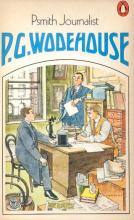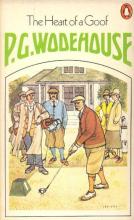 This Sunday, The Den(ver) of the Secret Nine met (and we were actually nine) to discuss P.G. Wodehouse’s Psmith Journalist, and it seems like everyone present enjoyed it, almost as much as we enjoyed having original member Mike’s (Phone Box) return after his hiatus.
This Sunday, The Den(ver) of the Secret Nine met (and we were actually nine) to discuss P.G. Wodehouse’s Psmith Journalist, and it seems like everyone present enjoyed it, almost as much as we enjoyed having original member Mike’s (Phone Box) return after his hiatus.
The novel engendered nostalgia in member Shawn (coffee) for Wodehouse’s early works, which was odd for he confessed he has only recently read those early works such as The Pothunters. I (club soda) enjoyed re-reading it for exactly the same reason I didn’t enjoy it the first time I read it, some thirty years ago: it’s not classic Wodehouse and doesn’t involve Bertie and Jeeves, Mulliners or the Blandings gang. I think member Larry (Phone Box) enjoyed it because of his love of classic pulps and also because he could envision the locales (because a transplanted New Yorker). And I think new member Mike (Phone Box) liked it because it’s a Boy’s Own tale, full of rough and ready adventure.
We were all struck by the social activism in the story and that this is one instance when a socialist in a Wodehouse story actually practices what he preaches when Comrade Psmith actually redistributes wealth.
By the way, a belated welcome to members Shirley (I didn’t catch her drink order) and Ron (Phone Box), who make the trek from Longmont and the more difficult flight of 17 steps to attend the meetings.
In short, we were very pleased member Janette (scotch and water) suggested Psmith Journalist for this month’s assigned reading and were very appreciative of the discussion notes she offered. (We also appreciate her making the trip from Nederland to attend.) She did reveal to us the Sherlockian point of interest to the novel—that it is the first recorded use of the phrase, “Elementary, my dear Watson.”
 Unfortunately her notes continue to up the standards first set by member Joice (who could not attend). And Janette won out again in suggesting that our next book will be our first discussion of Wodehouse’s golf stories: The Heart of a Goof. However, because it would be unfair to ask Janette to again supply notes and because member Shawn is a copious note-taker, he volunteered to compose the notes for our next outing, which will be May 8. He promises to attend, even though it coincides with Mothers’ Day.
Unfortunately her notes continue to up the standards first set by member Joice (who could not attend). And Janette won out again in suggesting that our next book will be our first discussion of Wodehouse’s golf stories: The Heart of a Goof. However, because it would be unfair to ask Janette to again supply notes and because member Shawn is a copious note-taker, he volunteered to compose the notes for our next outing, which will be May 8. He promises to attend, even though it coincides with Mothers’ Day.
And again another What, ho! to member Mike, who like Daniel has emerged from the lion’s den with little more than a smudge upon his immaculate Mechlin lace. We were all worried but he seemed in full vigor, even reminding me to remind the den that Daylight Savings Time was upon us.
I have to say I was very pleased with the meeting and the general sense of bonhomie and amity that prevailed. There’s nothing like getting together with like-minded individuals committed to enjoying something so frightfully silly.


 It’s time for March Madness at The Den(ver) of the Secret Nine when we meet Sunday, March 13, at 12:30 p.m. at
It’s time for March Madness at The Den(ver) of the Secret Nine when we meet Sunday, March 13, at 12:30 p.m. at  As usual, we’ll have lunch and relay any Plum-related news before tossing bread and discussing the novel, which brings Rupert Psmith to New York City and involves a cat, boxing, street gangs and social reform. Extra credit for those who read The Prince and Betty either in the US or UK editions.
As usual, we’ll have lunch and relay any Plum-related news before tossing bread and discussing the novel, which brings Rupert Psmith to New York City and involves a cat, boxing, street gangs and social reform. Extra credit for those who read The Prince and Betty either in the US or UK editions.